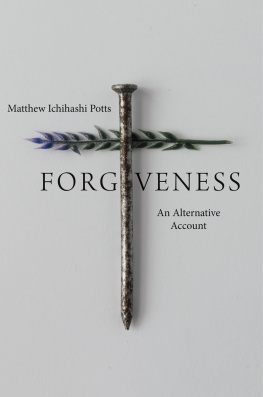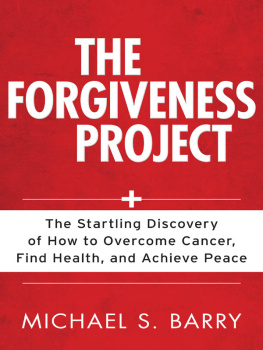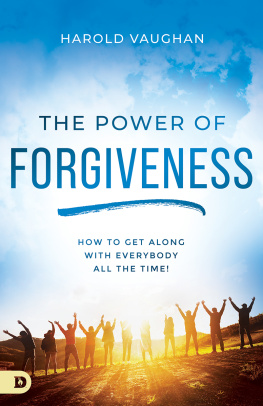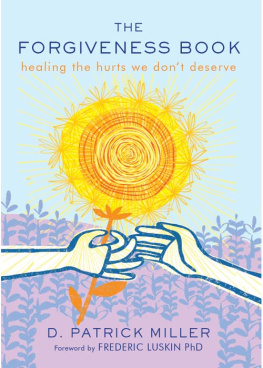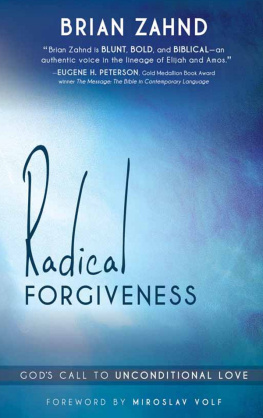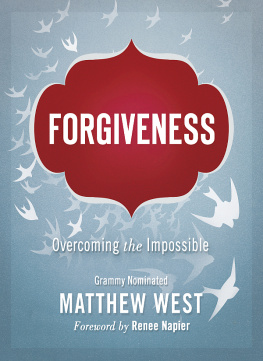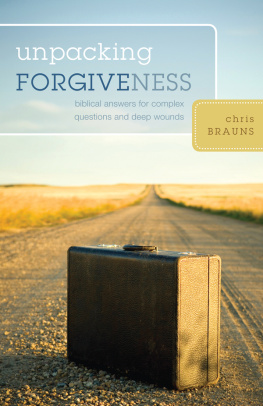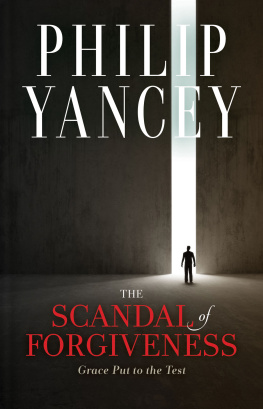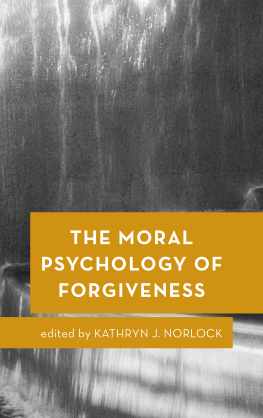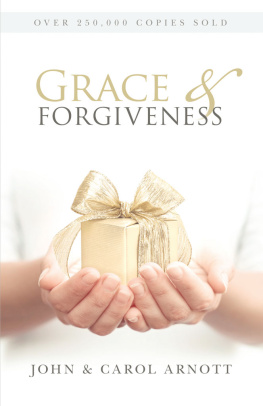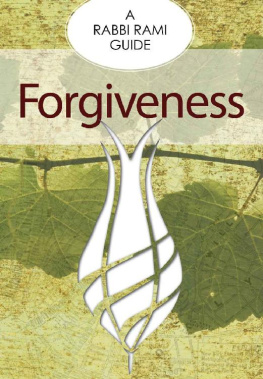Forgiveness

Published with assistance from the foundation established in memory of Amasa Stone Mather of the Class of 1907, Yale College.
Copyright 2022 by Yale University.
All rights reserved.
This book may not be reproduced, in whole or in part, including illustrations, in any form (beyond that copying permitted by Sections 107 and 108 of the U.S. Copyright Law and except by reviewers for the public press), without written permission from the publishers.
Yale University Press books may be purchased in quantity for educational, business, or promotional use. For information, please email (U.K. office).
Excerpts from Giving an Account of Oneself by Judith Butler, copyright 2005 by Fordham University Press, are republished with permission of Fordham University Press; permission was conveyed through Copyright Clearance Center, Inc.
Set in Adobe Garamond type by IDS Infotech Ltd.
Printed in the United States of America.
Library of Congress Control Number: 2022934656
ISBN 978-0-300-25985-8 (hardcover : alk. paper)
A catalogue record for this book is available from the British Library.
This paper meets the requirements of ANSI/NISO Z39.48-1992 (Permanence of Paper).
10 9 8 7 6 5 4 3 2 1
For Colette
Contents
Acknowledgments
I could not have completed this book without the help and support of many friends, family members, colleagues, institutions, and organizations. I am happy and humbled to acknowledge their aid and kindness here.
Dean David Hempton and the faculty of the Divinity School at Harvard University have afforded me generous periods of leave during which I have been able to read, research, and write much of what follows. I am sincerely grateful for the gift of this time and funding, and for my colleagues on the faculty. In particular, I thank Amy Hollywood and Stephanie Paulsell, both of whom read multiple drafts of this book and each of whom offered indispensable advice and counsel for its improvement. I have been working on the questions I investigate here since I was a masters degree student of Stephanies and a doctoral student of Amys. In many ways I believe this book to be as much a sign of their teaching as it is of my study, and I hope that it will leave them pleased and proud if that is so.
I also thank my students at Harvard, especially those who enrolled in my classes on forgiveness in the fall term of 2014 and the spring terms of 2017 and 2020. Its a truism that we learn most by teaching, but I guess its a truism because its true. Those classes and the challenging conversations they involved helped me immeasurably to develop my thinking about forgiveness. I especially thank my doctoral student and frequent teaching fellow Mac Loftin, whose close and perceptive engagement with this book and its argument at various stages of development have helped me enormously.
As I was initially drafting this book, the Louisville Institute helped to fund a portion of my research leave through its First Book Grant for Minority Scholars and also graciously welcomed me and other grant awardees into a winter seminar that I found incredibly focusing and fruitful. I am grateful for the institutes programming and its mission, and for having been included in both.
Thank you to Yale University Press, and especially to Jennifer Banks and Abbie Storch, who showed remarkable patience and encouragement as I toiled with this manuscript. Thank you to my copy editor, Jessie Dolch, whose close attention and diligence have corrected and clarified so much of what follows. Thank you to Ann-Marie Imbornoni for stewarding the manuscript through production, to Amanda Wilson for her expert indexing, and to Bob Land for his careful proofreading. Thank you also to my anonymous reviewers for the press, whose gentle yet incisive criticisms and ready enthusiasms have improved this book tremendously.
The first part of the introduction to this book originally appeared as part of a short essay in the journal Theology 122, no. 3 (May 2019): 18087. Thanks to the journal and to Professor Robin Gill for publishing that short piece and for permission to reproduce a small portion of it here.
Im grateful to Vanessa Zoltan for her patient and thorough reading of this book in its first full draft, for her responsive and helpful feedback, for her friendship, for making me laugh every week during our podcast recording, all over the course of many weeks when this book was (ever and interminably) only almost done.
I offer sincere thanks as well to two Christian churches that I served while writing this book. St. Barnabas Memorial Episcopal Church in Falmouth, Massachusetts, is the church where I learned how to be a priest and learned what it means to love and be loved by a congregation as its minister. Many of forgivenesss problems and much of its promise were made concrete to me in the lives of the people I served and loved at St. Barnabas. All of them, even those now alive only in memory and in the embrace of God, remain close to my heart. Im especially thankful to St. Barnabass former rector the Reverend Patti Barrett and to its former interim rector the Reverend Louise Forrest for the support, collegiality, and leave they granted as I drafted this book. Thanks also to the Reverend Deborah Warner, who served as a pastor to my family during a difficult time of transition. My new congregation, the Memorial Church of Harvard University, has been a place of warm welcome and joy since I took up its pulpit in the final months of writing this book. The congregation has engaged and advanced my ideas for years, and I am grateful that I can finish this book of theology as the Memorial Churchs new minister.
Finally, I offer deepest thanks to my family, from whom and for whom I have learned all my most significant lessons about love and forgiveness. In other words, they have given me my theology. Thank you to my wife Colettes parents, Petur, Pat, Dan, and Deb; to Colettes siblings, Jake, David, and Danielle; and to their families, Shelly and Richie, Atticus and Penelope. They have welcomed me as their own. Thank you to my own brothers, Daniel and Thomas, and to their families, Kiwa and Kelli, Stephen and Kensei, whom circumstance and pandemic have made distant but who stay ever close to my thoughts. Thank you to my parents, Daniel and Miyoko, who have shown a depth of love for one another and for their children I hope to emulate in my home, and who have met the challenges of these last years with a patience, a resilience, and a courage that heartens and moves me. Thank you to my children, Camilla, Samuel, and Daniel, who give me all the best stories and who each day pull me headlong into the wide sweep and reach of love. And last, thank you to my wife, Colette, with whom I make that daily fall and for whom I keep falling and falling. Thank you, Colette. This book is for you.
Forgiveness

Introduction
On June 17, 2015, a twenty-one-year-old white supremacist named Dylann Roof walked into historic Emanuel African Methodist Episcopal Church in Charleston, South Carolina, and joined thirteen others for the Wednesday evening Bible study. He sat next to the pastor, Clementa Pinckney, and listened for a while and then bickered with the group over their interpretation of scripture. When the congregants bowed their heads and began to pray at the close of the study, Roof rose, withdrew a concealed handgun, and began murdering the people who had welcomed him into their spiritual home. He killed nine members of the congregation and was quickly arrested. At his arraignment, several (but not all) of the victims surviving family members offered forgiveness to Roof through a closed circuit television feed to the jail where he had been remanded. I forgive you, Nadine Collier, daughter of seventy-year-old Ethel Lance, said through tears. You took something very precious from me. I will never talk to her again. I will never ever hold her again. But I forgive you. Bethane Middleton-Brown, sister of the slain DePayne Middleton-Doctor, said to Roof, I acknowledge that I am very angry. But ... [we] have no room for hating. So we have to forgive. I pray God on your soul. Wanda Simmons, the granddaughter of victim Daniel Simmons, also spoke directly to Roof, saying, Although my grandfather and the other victims died at the hands of hate, this is proof, everyones plea for your soul, is proof that they lived in love and their legacies will live in love.
Next page
